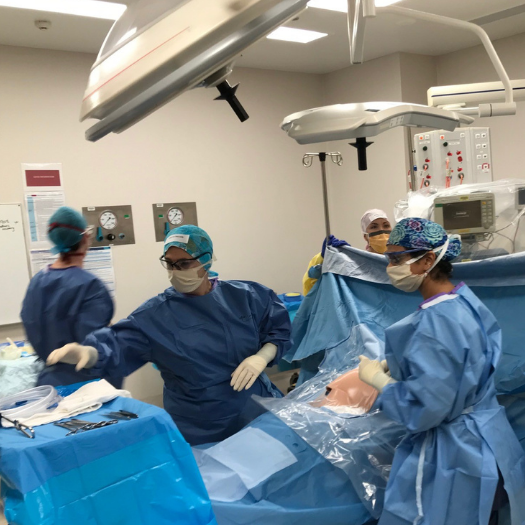Simulation training ensures highest standard of emergency care
 Most of the childbirth’s at Mater Mothers’ South Brisbane are beautiful moments that parents will treasure for the rest of their lives, but on the very rare occasion where things don’t go according to plan, our teams are well positioned to step into action to take care of both mother and baby to the highest clinical standards.
Most of the childbirth’s at Mater Mothers’ South Brisbane are beautiful moments that parents will treasure for the rest of their lives, but on the very rare occasion where things don’t go according to plan, our teams are well positioned to step into action to take care of both mother and baby to the highest clinical standards.
Today we meet the team dedicated to training and preparing our Mater Mothers’ team members for any medical emergency that may arise during a pregnancy, childbirth and the days following the birth of a baby.
Dr Sarah Janssens is the Director of Simulation at Mater Education and Senior Staff Specialist Obstetrics and Gynaecology at Mater Health who runs medical simulations to train and prepare both medical and midwifery team members for medical emergencies.
“We are dedicated to constantly training and upskilling our multi-disciplinary teams from senior obstetricians to undergraduate nursing and midwifery staff. All levels of skill are enhanced during medical simulations,” Sarah said.
“By receiving hands-on training in the most up-to-date best practice care, which is supported by research, we are ensuring our teams are ready to act when medical emergencies do arise.
“We train for every possible emergency, including post-partum haemorrhage, resuscitations, emergency surgeries and patient transfers which included us needing to incorporate COVID-19 response simulations into our program which fortunately we have not had to use yet.”
As a result of the intensive training, Education Coordinator, Sharon Clipperton, said team members have overwhelmingly reported they feel more confident to appropriately respond to emergency medical situations.
"We have found our teams work more cohesively together when responding to medical emergencies, with the simulation program supporting further development of a culture of collaboration. This is essential, as no one works in isolation and they are able to act rapidly when mobilised," Sharon said.
“Research demonstrates the biggest weakness of a team during a medical emergency is communication, so a large component of our training is teaching teams how to communicate with each other properly.
“The feedback we have received has been overwhelmingly positive and as one of the busiest maternity hospitals in Australia it’s important we are on the forefront of this training and expertise. We are looking forward to rolling this program out in Central and North Queensland later this year.”



